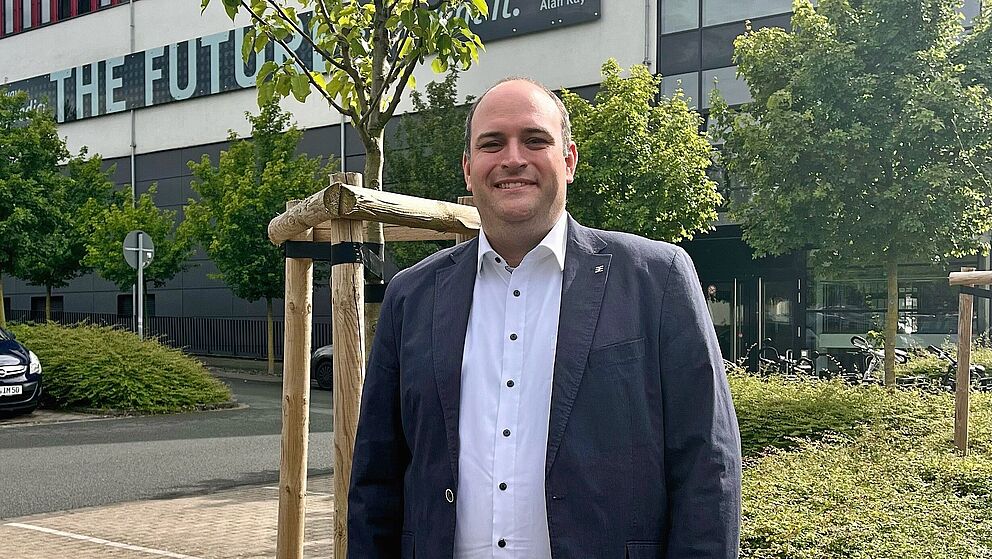Job profile computer science
Whether it's facial recognition on a smartphone, algorithms for listening to music or storing data in the cloud. All of these products and systems are based on software and information technologies (IT) that are co-created and developed by computer scientists. As a computer scientist, you can choose from a wide range of fields for your professional career. Here are some examples of how our graduates are working today.
According to the latest BITKOM study (Bundesverband Informationswirtschaft, Telekommunikation und neue Medien e.V.) from January 2022, the number of vacancies for IT professionals rose again in 2021 to 96,000. That is 12 per cent more than in the previous year. "Digitalisation is the answer to the pandemic, competition between locations and the climate crisis, but there is a shortage of experts," says BITKOM President Achim Berg. This means that computer scientists are in demand everywhere and have the best chances of entering the labour market in an industry that continues to grow!
Even if you may not yet know exactly which field you want to enter, we would like to give you an exemplary outlook on possible career fields at this point. This should help you to get an idea of what computer scientists do for a living and what you can expect after your studies. You can find further information on the website of the Gesellschaft für Informatik e.V.
Note: To check your own ideas and expectations regarding course content, requirements and career opportunities in the field of computer science, an expectation check (Computer Science Bachelor) is available onthe website of the Central Student Advisory Service (ZSB).
Computer scientist at work
A large proportion of working computer scientists are involved in the development of software. Software can be used, for example, to optimise processes and process large amounts of data in the shortest possible time. Software developers often have to create a customised software solution for the customer. The spectrum here ranges from business and medical software to simulation applications. However, software is also used in creative fields such as the development of digital games, multimedia applications or web design.
Mechanical solutions are increasingly being replaced by software components that take over the control of technical systems. Such software components are a fundamental part of many modern technical systems. This is also the case in the field of so-called embedded systems. These are developed for a predefined range of tasks (e.g. for medical technology, consumer electronics or automotive engineering). In the automotive industry, for example, computer scientists work on navigation systems, auxiliary systems such as the anti-lock braking system (ABS) or communication and test software for vehicle diagnostics.
Almost all companies have more or less large networked computer systems that make it easier for employees to exchange information with each other and work together. Such networks have to function around the clock; they have to be set up, operated, expanded and monitored. Computer scientists take on these tasks, for example by installing computer systems and software, configuring devices and networks and ensuring ongoing operation.
Computer scientists are extensively involved in the design and transmission of new media. Job opportunities can be found, for example, in web development, multimedia design or the management and provision of digital media content. Computer scientists and computer graphic artists are also responsible for graphic overlays and special effects in television and film. At a time when music downloads, online games, virtual worlds and Internet television are becoming increasingly popular, computer science professionals with in-depth media knowledge are in high demand, especially among mobile phone providers, television broadcasters and telecommunications or IT service providers.
Due to increasing networking, protection against viruses and worms is becoming an ever-growing field of work for computer scientists. Consultancy and support in this regard are particularly needed in small to medium-sized companies. IT security experts must be able to create user-friendly systems that are easy for customers to use and understand. Topics such as digital rights management to protect copyrights to digital media and the automated recognition of people (biometrics) - for example using fingerprints - will also become even more important in the context of IT security in the future.
In addition to designing and creating software solutions, computer scientists are particularly in demand for consulting and support for IT solutions. In today's business world, much depends on a functioning IT structure. For example, it must support development and operating processes or enable internal and external communication. IT consultants therefore often work directly with customers and support them in creating the right IT structure for their needs. After the successful consultation and delivery of a customised IT solution, the customer's staff must be trained in the use of the IT solution. In addition to training, the most important tasks in this field also include support in the event of system failures, maintenance and the further development of the IT solution.
Computer scientists are also used as specialists for direct sales, i.e. the sale of IT solutions (software and hardware). In order to be able to sell a product, it is necessary to know it inside out. In the necessary product training courses, computer scientists usually have no problems understanding the subject matter, as they already have the necessary basic knowledge from their studies. For this reason, computer scientists with additional communication skills are particularly sought after in IT solution sales.
In addition to the possibility of a career at a university, computer scientists are also involved in research in the private sector in many industries, looking for new opportunities and improvements. For example, computer scientists in the aerospace industry work in development and research in the field of simulation software and computerised flight support.
IT will play an even more important role in the markets of the future. The embedded systems already mentioned represent one such future market. The distribution of multimedia offerings (e.g. online television) via the Internet and on mobile data carriers is also one of the growing markets in the IT sector. As IT systems continue to be upgraded in all fields, the IT services sector will also continue to grow. This includes the field of IT security, in particular biometric procedures and digital rights management. In all of these fields, computer scientists are highly involved in the further development and dissemination of new technologies.
In addition to the traditional software house industry, computer scientists are in demand as professionals in many other industries. The most important of these include Management consultancies and services, trade, credit institutions, insurance companies, data processing services, architecture and engineering firms, the automotive and motor industry as well as public administration and social services.
The cliché of the computer scientist as a lone programmer in a quiet little room is not borne out in the professional world. In the software industry, for example, computer scientists often work in large development teams, sometimes spread across several locations, and liaise closely with the customer. Flexibility, communication and teamwork skills are therefore important personal characteristics (so-called "soft skills") in this field of work. You can see which other "soft skills" IT employers place a high value on in the following graphic (read: in 26% of the job advertisements, the ability to work in a team was required of the applicants):




